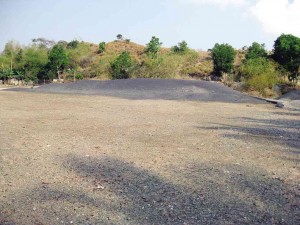Pangasinan black sand mine case: NBI help sought in probe

PART of the stockpile of magnetite sand found by environment authorities in a private port in Sual, Pangasinan province, and which was transported allegedly without permits. Photo was taken on March 10. CONTRIBUTED PHOTO
Environment Secretary Ramon Paje said his department would definitely support the recommendation to deny the application for an environment compliance certificate (ECC) by Xypher Builders Inc.
“In the first place, they are not mining. They are only building a golf course, so why are they applying for a [permit for a] mineral-processing plant?” he said.
Paje said the magnetite extracted from the construction was only incidental and not a result of an approved mining operation, and “thus the minerals should be turned over to the state.”
He further noted that no mining would actually be allowed in the area as it was on the shoreline, and therefore a “no go zone.”
“That shipment to Sual was illegal. I want to know who gave the permit for the shipment to leave the port,” Paje said.
Article continues after this advertisementThe Environmental Management Bureau (EMB) in northern Luzon discovered that Xypher Builders, which was tapped to build a golf course in Lingayen as part of a provincial ecotourism project, had shipped out magnetite from its stockpile to a private port in Sual.
Article continues after this advertisementPaje said the Anti-Illegal Mining Task Force of the National Bureau of Investigation would spearhead the investigation.
“That will form part of the NBI probe. Xypher does not have the environmental compliance certificate to operate its mineral-processing plant as well as for its marine-loading facility,” he added.
The shipment to Sual was made despite an existing cease-and-desist order from the Department of Environment and Natural Resources (DENR) on black sand mining within the Lingayen golf course project.
The DENR earlier issued the order against Alexandra Mining and Xypher Builders to prevent magnetite, or black sand, mining along the coastal areas of Lingayen Gulf in Sabangan, Malimpuec, Capandanan and Estanza.
It also ordered Xypher to pay P50,000 as a penalty for operating without an ECC, which the company eventually secured for the golf course project but not for the mineral-processing plant or for its marine-loading facility.
“If the company continues with the extraction of black sand, then we will be forced to issue another cease-and-desist order,” said Joel Salvador, EMB Ilocos regional director, in a report to the head office of the EMB on March 12.
Xypher admitted that it transferred 1,000 metric tons of black sand to a private port in Sual town, but said there was nothing irregular about the activity.
“[There was] one, single instance when the transfer of 1,000 MT of materials was effected in August 2012. After that, there was no other subsequent transfer of any kind of material from the ecotourism zone in Lingayen,” the firm said in a statement.
But in examining Xypher’s property, the EMB discovered the stockpile of black sand.
In a March 11 memorandum to Paje, the EMB recommended the investigation of Xypher because of the magnetite stockpile.
Salvador also recommended the denial of Xypher’s ECC application.
“That particular transfer was made only after a field verification report was conducted by the Mines and Geosciences Bureau, which served as basis for the payment of required taxes, and consequently, the issuance of an ore transport permit (OTP),” said Belen Rocheford, Xypher Builders president, in the company statement distributed to reporters by the Pangasinan provincial information office on Monday.
Salvador said the existence of the stockpile indicated that the company had been operating a mineral-processing plant before it applied for permits. Reports from DJ Yap in Manila, and Yolanda Sotelo, Inquirer Northern Luzon